A sacrament in which the Holy Ghost is given to those already baptized in order to make them strong and perfect Christians and soldiers of Jesus Christ.
It has been variously designated: bebaiosis or confirmatio, a making fast or sure; teleiosis or consummatio, a perfecting or completing, as expressing its relation to baptism. With reference to its effect it is the "Sacrament of the Holy Ghost", the "Sacrament of the Seal" (signaculum, sigillum, sphragis). From the external rite it is known as the "imposition of hands" (epithesis cheiron), or as "anointing with chrism" (unctio, chrismatio, chrisma, myron). The names at present in use are, for the Western Church, confirmatio, and for the Greek, to myron.
Present practice and doctrine
Rite
In the Western Church the sacrament is usually administered by the bishop. At the beginning of the ceremony there is a general imposition of hands, the bishop meantime praying that the Holy Ghost may come down upon those who have already been regenerated: "send forth upon them thy sevenfold Spirit the Holy Paraclete." He then anoints the forehead of each with chrism saying: "I sign thee with the sign of the cross and confirm thee with the chrism of salvation, in the name of the Father and of the Son and of the Holy Ghost." Finally, he gives each a slight blow on the cheek saying: "peace be with thee". A prayer is added that the Holy Spirit may dwell in the hearts of those who have been confirmed, and the rite closes with the bishop's blessing.
The Eastern Church omits the imposition of hands and the prayer at the beginning, and accompanies the anointing with the words: "the sign [or seal] of the gift of the Holy Ghost." These several actions symbolize the nature and purpose of the sacrament: the anointing signifies the strength given for the spiritual conflict; the balsam contained in the chrism, the fragrance of virtue and the good odor of Christ; the sign of the cross on the forehead, the courage to confess Christ, before all men; the imposition of hands and the blow on the cheek, enrollment in the service of Christ which brings true peace to the soul. (Cf. Summa Theologiæ III.72.4).
Minister
The bishop alone is the ordinary minister of confirmation. This is expressly declared by the Council of Trent (Sess. VII, De Conf., C. iii). A bishop confirms validly even those who are not his own subjects; but to confirm licitly in another diocese he must secure the permission of the bishop of that diocese. Simple priests may be the extraordinary ministers of the sacrament under certain conditions. In such cases, however, the priest cannot wear pontifical vestments, and he is obliged to use chrism blessed by a Catholic bishop. In the Greek Church, confirmation is given by simple priests without special delegation, and their ministration is accepted by the Western Church as valid. They must, however, use chrism blessed by a patriarch.
Matter and form
There has been much discussion among theologians as to what constitutes the essential matter of this sacrament. Some, e.g. Aureolus and Petavius, held that it consists in the imposition of hands. Others, with St. Thomas, Bellarmine, and Maldonatus, maintain that it is the anointing with chrism. According to a third opinion (Morinus, Tapper) either anointing or imposition of hands suffices. Finally, the most generally accepted view is that the anointing and the imposition of hands conjointly are the matter. The "imposition", however, is not that with which the rite begins but the laying on of hands which takes place in the act of anointing. As Peter the Lombard declares: Pontifex per impositionem manus confirmandos ungit in fronte (IV Sent., dist. xxxiii, n. 1; cf. De Augustinis, "De re sacramentaria", 2d ed., Rome, 1889, I). The chrism employed must be a mixture of olive oil and balsam consecrated by a bishop. (For the manner of this consecration and for other details, historical and liturgical, see CHRISM.) The difference regarding the form of the sacrament, i.e. the words essential for confirmation, has been indicated above in the description of the rite. The validity of both the Latin and the Greek form is unquestionable. Additional details are given below in the historical outline.
Recipient
Confirmation can be conferred only on those who have already been baptized and have not yet been confirmed. As St. Thomas says:
Confirmation is to baptism what growth is to generation. Now it is clear that a man cannot advance to a perfect age unless he has first been born; in like manner, unless he has first been baptized he cannot receive the Sacrament of Confirmation (Summa Theologiæ III.72.6).
They should also be in the state of grace; for the Holy Ghost is not given for the purpose of taking away sin but of conferring additional grace. This condition, however, refers only to lawful reception; the sacrament is validly received even by those in mortal sin. In the early ages of the Church, confirmation was part of the rite of initiation, and consequently was administered immediately after baptism. When, however, baptism came to be conferred by simple priests, the two ceremonies were separated in the Western Church. Further, when infant baptism became customary, confirmation was not administered until the child had attained the use of reason. This is the present practice, though there is considerable latitude as to the precise age. The Catechism of the Council of Trent says that the sacrament can be administered to all persons after baptism, but that this is not expedient before the use of reason; and adds that it is most fitting that the sacrament be deferred until the child is seven years old, "for Confirmation has not been instituted as necessary for salvation, but that by virtue thereof we might be found well armed and prepared when called upon to fight for the faith of Christ, and for this kind of conflict no one will consider children, who are still without the use of reason, to be qualified." (Pt. II, ch. iii, 18.)
Such, in fact, is the general usage in the Western Church. Under certain circumstances, however, as, for instance, danger of death, or when the opportunity of receiving the sacrament is but rarely offered, even younger children may be confirmed. In the Greek Church and in Spain, infants are now, as in earlier times, confirmed immediately after baptism. Leo XIII, writing 22 June, 1897, to the Bishop of Marseilles, commends most heartily the practice of confirming children before their first communion as being more in accord with the ancient usage of the Church.
Effects
Confirmation imparts
an increase of sanctifying grace which makes the recipient a "perfect Christian";
a special sacramental grace consisting in the seven gifts of the Holy Ghost and notably in the strength and courage to confess boldly the name of Christ;
an indelible character by reason of which the sacrament cannot be received again by the same person.
A further consequence is the spiritual relationship which the person confirming and the sponsor contract with the recipient and with the recipient's parents. This relationship constitutes a diriment impediment to marriage. It does not arise between the minister of the sacrament and the sponsor nor between the sponsors themselves. var AID=0;var AsID=1414;-->
Necessity
Regarding the obligation of receiving the sacrament, it is admitted that confirmation is not necessary as an indispensable means of salvation (necessitate medii).
On the other hand, its reception is obligatory (necessitate præcepti) "for all those who are able to understand and fulfill the Commandments of God and of the Church. This is especially true of those who suffer persecution on account of their religion or are exposed to grievous temptations against faith or are in danger of death. The more serious the danger so much greater is the need of protecting oneself". (Conc. Plen. Balt. II, n. 250.) As to the gravity of the obligation, opinions differ, some theologians holding that an unconfirmed person would commit mortal sin if he refused the sacrament, others that the sin would be at most venial unless the refusal implied contempt for the sacrament. Apart, however, from such controversies the importance of confirmation as a means of grace is so obvious that no earnest Christian will neglect it, and in particular that Christian parents will not fail to see that their children are confirmed.
Sponsors
The Church prescribes under pain of grievous sin that a sponsor, or godparent, shall stand for the person confirmed. The sponsor should be at least fourteen years of age, of the same sex as the candidate, should have already received the Sacrament of Confirmation, and be well instructed in the Catholic Faith. From this office are excluded the father and mother of the candidate, members of a religious order (unless the candidate be a religious), public sinners, and those who are under public ban of interdict or excommunication. Except in case of necessity the baptismal godparent cannot serve as sponsor for the same person in confirmation. Where the opposite practice obtains, it should, according to a decree of the Sacred Congregation of the Council, 16 Feb., 1884, be gradually done away with. The Second Plenary Council of Baltimore (1866) declared that each candidate should have a sponsor, or that at least two godfathers should stand for the boys and two godmothers for the girls (n. 253). See also prescriptions of the First Council of Westminster. Formerly it was customary for the sponsor to place his or her right foot upon the foot of the candidate during the administration of the sacrament; the present usage is that the sponsor's right hand should be placed upon the right shoulder of the candidate. The Holy Office decreed, 16 June, 1884, that no sponsor could stand for more than two candidates except in case of necessity. The custom of giving a new name to the candidate is not obligatory; but it has the sanction of several synodal decrees during the fifteenth and sixteenth centuries. The Fifth Council of Milan, under St. Charles Borromeo, insisted that a candidate whose name was "vile, ridiculous, or quite unbecoming for a Christian" should receive another at Confirmation" (cf. Martène).
It is clear from the diversity of practice at the present day, that there is much uncertainty as to the doctrine concerning confirmation. It is certain that the sacrament is validly and lawfully administered in the Church; but this does not solve the theological questions regarding its institution, matter, form, and minister.
At the time of the Council of Trent the difficulty was felt to be so great that the assembled Fathers contented themselves with only a few canons on the subject. They defined that confirmation was not "a vain ceremony but a true and proper sacrament"; and that it was not "in olden days nothing but a sort of catechism in which those who were entering upon youth gave an account of their faith in the face of the Church" (can. i). They did not define anything specific about the institution by Christ; though in treating of the sacraments in general they had already defined that "all the sacraments of the New Law were instituted by Christ our Lord" (Sess. VII, can. i). Nothing whatever was said about the form of words to be used; and regarding the matter they merely condemned any one who should maintain "that they who ascribe any virtue to the sacred chrism of confirmation offer an outrage to the Holy Ghost" (can. ii). The third and last canon defined that the "ordinary" minister of the sacrament is a bishop only, and not any simple priest.
This guarded language, so different from the definite canons on some of the other sacraments, shows that the council had no intention of deciding the questions at issue among theologians regarding the time and manner of the institution by Christ (direct or indirect institution), the matter (imposition of hands or anointing, or both), the form ("I sign thee", etc., or "the seal", etc.), and the minister (bishop or priest).
Elsewhere (Sess. VII, can. ix) the council defined that in confirmation a character is imprinted in the soul, that is, a certain spiritual and indelible sign on account of which the sacrament cannot be repeated; and again (Sess. XXIII) the council declared that "bishops are superior to priests; they administer the Sacrament of Confirmation; they ordain the ministers of the Church; and they can perform many other things over which functions others of an inferior rank have no power".
Concerning the administration of the sacrament from the earliest times of the Church, the decree of the Inquisition (Lamentabili sane, 3 July, 1907) condemns the proposition (44): "There is no proof that the rite of the Sacrament of Confirmation was employed by the Apostles; the formal distinction, therefore, between the two sacraments, Baptism and Confirmation, does not belong to the history of Christianity". The institution of the sacrament has also been the subject of much discussion as will appear from the following account.
www.newadvent.org
Christian Education
"Since all Christians have become by rebirth of water and the Holy Spirit a new creature(8) so that they should be called and should be children of God, they have a right to a Christian education. A Christian education does not merely strive for the maturing of a human person as just now described, but has as its principal purpose this goal: that the baptized, while they are gradually introduced the knowledge of the mystery of salvation, become ever more aware of the gift of Faith they have received, and that they learn in addition how to worship God the Father in spirit and truth (cf. John 4:23) especially in liturgical action, and be conformed in their personal lives according to the new man created in justice and holiness of truth (Eph. 4:22-24); also that they develop into perfect manhood, to the mature measure of the fullness of Christ (cf. Eph. 4:13) and strive for the growth of the Mystical Body; moreover, that aware of their calling, they learn not only how to bear witness to the hope that is in them (cf. Peter 3:15) but also how to help in the Christian formation of the world that takes place when natural powers viewed in the full consideration of man redeemed by Christ contribute to the good of the whole society.(9) Wherefore this sacred synod recalls to pastors of souls their most serious obligation to see to it that all the faithful, but especially the youth who are the hope of the Church, enjoy this Christian education."
Gravissimum Educationis
Gravissimum Educationis
Thursday, April 2, 2009
Subscribe to:
Post Comments (Atom)






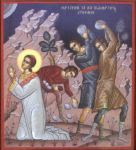







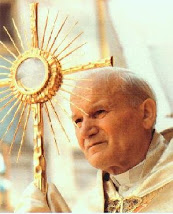











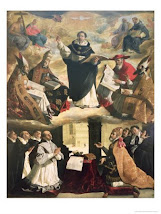
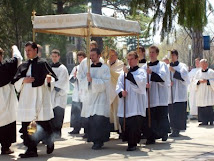




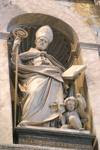



No comments:
Post a Comment